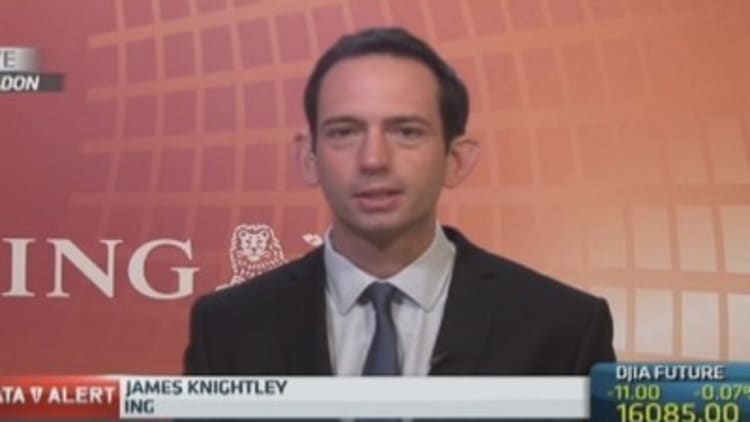
Inflation in the U.K. fell once again in March, hitting its lowest level since October 2009, as the cost of living fell further below the Bank of England's target of two percent.
Consumer prices rose 1.6 percent year-on-year in March, in line with forecasts, and at its lowest point in four years. Inflation has been steadily dropping month-on-month in 2014: consumer prices rose 1.7 percent in February and 1.9 percent in January.
The Office of National Statistics (ONS) said that the gap between inflation and average wage growth was at its narrowest since April 2010.
James Knightley, U.K.economist at ING, told CNBC that inflation could certainly head further south, possibly down to 1.4 percent.
"We're looking at the key components: there is a supermarket price war going on. Food price inflation is already at the lowest for a considerable length of time, so that's going to weaken further," he said.
"We've also had the British Retail Consortium reporting that shop prices – excluding food - are at record lows as well. So that's going to continue to weigh as well. Petrol prices at the pump are gradually trending lower. So it also pointing to lower headline rates probably down to 1.4 (percent)."
Howard Archer, Chief UK and European Economist at IHS Global Insight, concurred with Knightley, believing that inflation should remain below 2 percent for the rest of the year and even beyond.
"Underlying price pressures should be limited for some time to come," he wrote in a note. "GDP (gross domestic product) growth is seen coming in at 2.8 percent in 2014, this should not lead to any marked pick up in underlying inflationary pressures given the slack in the economy after extended very weak economic activity."
Read MoreUK inflation sinks to 4-year low
Bubble debate
While the picture may be brighter for consumers, for home buyers the housing market continues to grow ever pricier. The ONS announced that house prices in Britain rose by 9.1 percent in the year to February, the biggest rise since June 2010. That was a sharp increase from a 6.8 percent year-on-year rise back in January.
U.K. house prices have been rapidly rising, particularly in London and the south-east, buoyed by historically low interest rates, an acute shortage of supply and a government mortgage scheme called Help to Buy.
A raft of recent reports has commented on rising housing prices in the U.K. and the creation of a possible bubble, with London in focus.
Read MoreRoyal family, Bank of England warn of housing 'shock'
A study by the Royal Institution of Chartered Surveyors (RICS) forecast property prices in Britain would rise 6 percent yearly over the next five years. RICS' survey showed that the average number of houses sold per surveyor in March rose to 22.7, the highest since February 2008.
Even three pillars of the British establishment have weighed into the debate. The Bank of England, the Office for Budget Responsibility (OBR) and a member of the British royal family all warned of a housing "shock", with heir to the throne, Prince Charles warning the average London house price will have risen 40 percent to £650,000 ($1.08 million) in six years' time.
However, the EY ITEM Club on Monday said that it expects price growth in the "simmering" housing market to ease next year and to fall significantly by 2016, preventing an "unsustainable boom," explaining that borrowers will face tighter lending restrictions and an increase in housing supply will ease the price surge in the country.
Read More'Unsustainable' boom in UK property to cool by 2016

